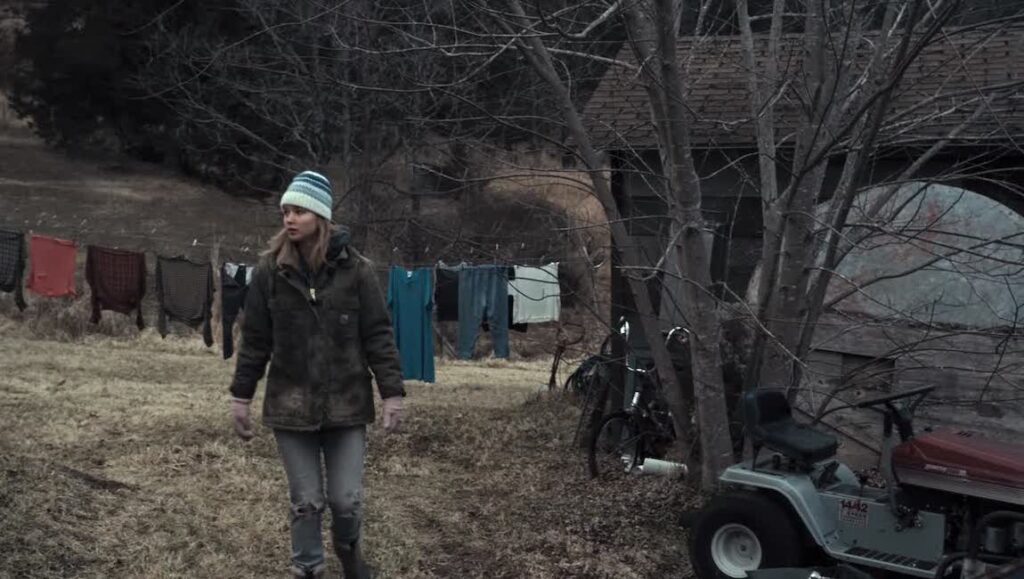The chill comes off the screen. Ice hangs from the roofs and tree limbs. Frost covers the ground. The girl is in a boat, drifting through the water. Everything is muted and cool, a decaying storm-cloud blue that overwhelms girl and audience alike. She’s just 17 but seems so much older, possessing a maturity that comes from living a life of adult demands and responsibilities. The boat stops. The girl reaches into the water with both hands. She gasps, and so do we. We gasp because we know what’s down there, what she’s just touched. But we gasp, too, simply because we feel it: That water’s cold.
Debra Granik’s Winter’s Bone is a cold movie. Which is not to say that it’s distanced or calculated or unemotional. It’s not cold like Michael Haneke is cold. It’s cold like Arkansas in the dead of winter is cold, and its every moment is suffused with the languorous, creeping dread of the weather. Winter’s Bone is, largely, a film about an atmosphere and an environment, and about how that environment affects its characters. The girl in the boat is Ree Dolly (Jennifer Lawrence), who’s forced to take care of her mentally ill mother and two young siblings after her meth-cooking father leaves home. One day, the sheriff shows up at Ree’s door with some bad news. Her father has a trial coming up, but he can’t be tracked down. He put his home up for bond, so if he doesn’t show for the trial, Ree’s family will lose their house and their land. With just a few days to go, Ree treks into the dark heart of the Ozarks’ meth trade in search of her daddy.
Winter’s Bone won the Grand Jury Prize at Sundance this year, and though its focus on an impoverished corner of the country may call to mind unfortunate Sundance hits like Frozen River and Precious, it’s something else entirely. Where those films were manipulative and condescending, Winter’s Bone is uncompromising. It calls to mind William Faulkner and Flannery O’Connor in its interest in the mysterious, gothic texture of the South, as well as in the overwhelming (and sometimes toxic) pull of family. Ree’s strongest ally in her search is her uncle Teardrop (John Hawkes), a volatile scarecrow of a man with a fierce temper but even fiercer loyalty to his kin. Together, the two take on local criminals (to most of whom they are distantly related) to find the truth, risking their own safety in the process.
In its plot particulars, Winter’s Bone has led some reviewers to describe it as a deep-south film noir, which isn’t that far off. Granik, like many of the great noir directors, uses her plot and visual style to evoke a creeping, dangerous moral imbalance. It’s the stuff of spare, foreboding landscapes and a constant mood of danger and hostility. There’s the lingering sense of a world corrupted by a poverty that has left its denizens willing to do whatever it takes to get by, one in which family is just as often corrupting as supportive. Granik’s script, adapted with Anne Rosellini from a novel by Daniel Woodrell, has a noir-like ear for terse, darkly comic dialogue. “That’s a good way to end up et by pigs,” Teardrop warns Ree at one point. “Or to wish you was.” And later, after Ree kills a squirrel and has her brother remove its intestines, he asks if they eat the organs. Ree doesn’t miss a beat: “Not yet.”
It’s a laugh-line that speaks to the depths of Winter’s Bone’s characters and their situation, largely thanks to its actors’ exceptional, lived-in performances. Hawkes, a character actor of extraordinary range, will hopefully attract some long-deserved awards attention for his work here, which makes a complicated character entirely coherent, with no winking or showy actor tricks. And Lawrence belies her sitcom background (she was the hot daughter on The Bill Engvall Show, of all things) with a performance of heartbreaking resolve and intensity. She never begs for sympathy, nor does Granik ever play on her audience’s middle-class liberal guilt. Instead, she lets Ree’s determination speak for itself, turning something that most viewers take for granted — the pure fact of day-to-day survival — into the stuff of heart-stopping drama.


Comments are closed.